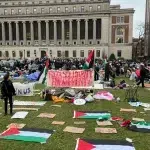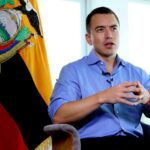
By Ram Puniyani – Sep 15, 2021
“Dismantling Global Hindutva”, an online global conference was recently held from September 10-12, 2021. It was addressed by nearly 15 activists and scholars who are working on the intolerant politics and different facets of the rising Hindu nationalism at home in India and abroad. Fifty two US universities (their 70 departments) came together to put this big meeting, for which over fifteen thousand people registered. While the mainstream Indian media practically blacked it out, huge noise opposing the event was there in the social media.
In the prelude to the conference, primarily centered in America, US affiliates of Hindu nationalists were overzealous in trying to block the conference. Thousands of emails were sent to US universities, one of the results being the server of one University got dysfunctional due to the overload. The speakers in this conference were trolled heavily and the women speakers were given sexually abusive threats. Just as an aside lets note that US has heavy presence of RSS affiliates, like VHPA (Vishwa Hindu Parishad of America) among others.
RELATED CONTENT: Romila Thapar, Irfan Habib Decry Hindutva Attempts To Distort India’s History
They argued that this is an attempt to attack the Hindus. As such the aims of conference were aptly summed up by one of the speakers in the conference; Meena Kandasamy, an author and poet of distinction, “The conference is an opportunity to understand how Hindutva poses itself as Hinduism and identifies India with its undemocratic ideology and politics. This is important because Hindutva has become the ideology of the Indian state with all its undemocratic implications for women, Dalits, Muslims, and the right to dissent.”
Most of the speakers were from US universities, while noted film-maker Anand Patwardhan, and Bhanwar Meghwanshi, prominent dalit activists from India, made important contributions in the conference. The major attack on the conference was on the ground that it is trying to demonize Hindus. Those from India who have immigrated to these places for careers or business are in substantial numbers. Many of the Hindus who settle there do feel alienated and so want to keep their Hindu identity to the fore. RSS affiliates have been the major organizations which have been very active among these NRI’s who are not only big supporters of their ideology but also give heavy donations to different wings of Hindu nationalist organization.
The main objection to the conference from this section of NRIs (non resident Indians), who also had been core part of the events like Howdy Modi, was that the Hindus are being targeted. Clearly the conference was not against Hinduism, it was a critique of Hindutva politics, which is different from Hinduism, the religion. Hindutva term is a political one. It was first coined by Chandra Nath Basu in 1890s and brought to forefront in 1923 by V.D. Savarkar in his book, “Hindutva or Who is a Hindu?”.
The emergence of the term in 1890s has not been registered much, but it is significant and tells us why the elementary notion of Hindu nationalism finds its articulation from this time. The backdrop of this is the process of social change whereby dalits on one hand and women on the other start coming to the social space. The entry of education to these two major sections of society in a way changes the perception of the society which was primarily feudal with strong caste and gender biases. As the newer sections threw up associations in parallel to the social changes these associations came together to form the Indian National Congress (INC) in 1885. INC did represent the nascent Indian nationalism.
Those social powers opposed to the decline in their status and powers resorted to politics in the name of religion, to revive the earlier social stature of dominance in the name of glory of their religion. At this point of time Muslim nationalism on one hand and Hindu nationalism on the other, both in their nascent forms, emerge and crystallize. That’s how in due course later they get full expression.
RELATED CONTENT: India’s Undeclared Emergency: Often More Chilling Than in 1975
Savarakar who popularized this word, had some dilemmas. He was against these social changes for equality and also against the Muslims. The synthesis of these two led to the clear formulation of the term Hindutva and he did relate it to Aryan race, Brahmanical culture and this land.
It is during this time that Gandhi emerged. Gandhi, the greatest Hindu of his time, perceived the problems of multi religious society and the need to reform Hindu society. Defining Hinduism has never been linear, as it is not a prophet-based religion with a single Holy book or single set of clergy. Its diversity is manifest all around; it has multiple sects, Brahmanism, Nath, Tantra, Bhakti, Shaiva, Siddhanta being few among the multitude.
Hindutva is based primarily in the Brahmanical norms, which are deliberately hidden from its commentaries. Hindu nationalism, as it evolved in opposition to Indian nationalism, led by Gandhi, Nehru and Patel accepted the diversity within Hinduism and worked for freedom of the country from the colonial slavery. Hindutva, the politics of Hindu nationalism not only kept aloof from freedom movement, it was totally opposed to the social empowerment towards equality of dalits and women in a very clear way.
During last three decades one of the impositions of the sectarian nationalism is to popularize the word Hindutva. Now this nationalism asserts that there is no difference between Hinduism and Hindutva. This is very deliberate as all the attacks on minorities are in the name of Hindutva (lynchings over cow-beef), killings (love jihad). Anand Patwardhan summed the relationship between Hinduism and Hindutva very well with his title of the talk-based article in Scroll, “If Hindutva is Hinduism then Ku Klux Klan is Christianity.”
Born in a Hindu family, with all its rituals and festivals intact; I never heard the word Hindutva anytime. The notion that Lord Ram was born in Ajodhya and Hindutva is same as Hinduism are the political formulations instilled and popularized among large population during last few decades only. I will like to sum up the Hindutva: Hinduism by stating that Gandhi was Hinduism and Godse was Hindutva!
Featured image: BJP and its religious affiliates are on a mission to equate Hinduism, the religion, with Hindutva, religious extremism. File photo
- scorinocohttps://orinocotribune.com/author/sahelicot92/
- scorinocohttps://orinocotribune.com/author/sahelicot92/
- scorinocohttps://orinocotribune.com/author/sahelicot92/
- scorinocohttps://orinocotribune.com/author/sahelicot92/
Tags: Bharatiya Janata Party (BJP) Hindutva inequality Mahatma Gandhi religious fundamentalism terrorism
Share this:
- Click to share on Twitter (Opens in new window)
- Click to share on Facebook (Opens in new window)
- Click to share on LinkedIn (Opens in new window)
- Click to share on WhatsApp (Opens in new window)
- Click to share on Reddit (Opens in new window)
- Click to share on Telegram (Opens in new window)
- Click to email a link to a friend (Opens in new window)





